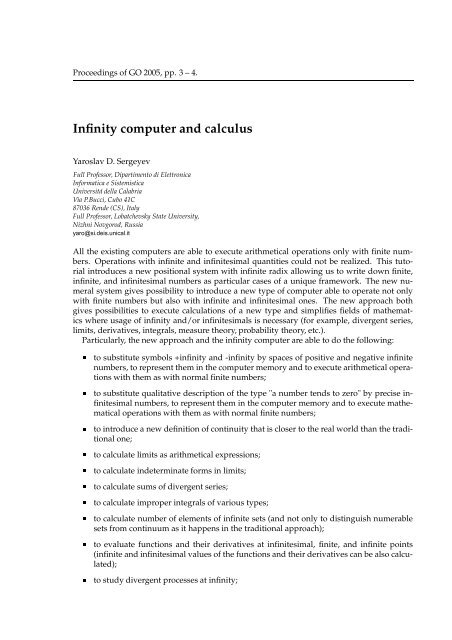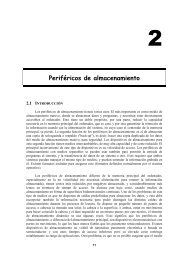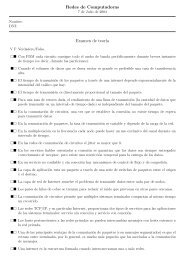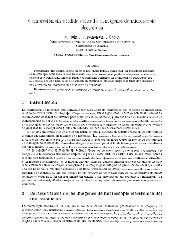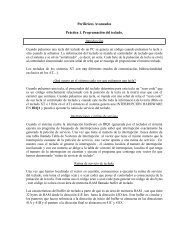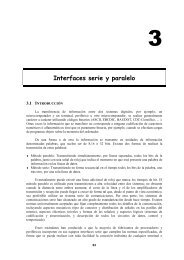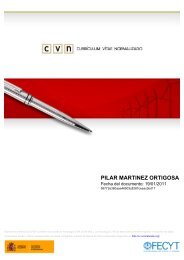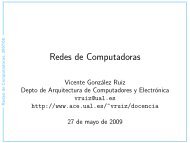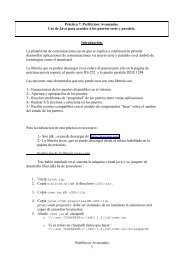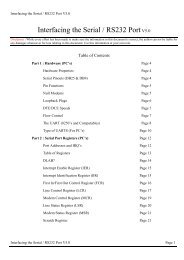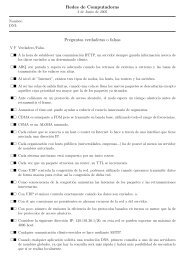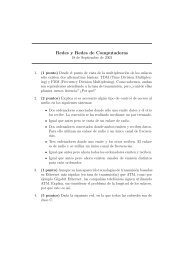- Page 1: PROCEEDINGS OF THEINTERNATIONAL WOR
- Page 5 and 6: ContentsPrefaceiiiPlenary TalksYaro
- Page 7 and 8: ContentsviiFuh-Hwa Franklin Liu, Ch
- Page 9: PLENARY TALKS
- Page 13: Proceedings of GO 2005, pp. 5 - 5.R
- Page 17 and 18: Proceedings of GO 2005, pp. 9 - 14.
- Page 19 and 20: A Trust-Region Algorithm for Global
- Page 21 and 22: A Trust-Region Algorithm for Global
- Page 23 and 24: Proceedings of GO 2005, pp. 15 - 16
- Page 25 and 26: Proceedings of GO 2005, pp. 17 - 22
- Page 27 and 28: Algorithms for Robust k-path Routin
- Page 29 and 30: Algorithms for Robust k-path Routin
- Page 31 and 32: Proceedings of GO 2005, pp. 23 - 28
- Page 33 and 34: The Small Octagon with Longest Peri
- Page 35 and 36: The Small Octagon with Longest Peri
- Page 37 and 38: Proceedings of GO 2005, pp. 29 - 34
- Page 39 and 40: Analysis of a nonlinear optimizatio
- Page 41 and 42: Analysis of a nonlinear optimizatio
- Page 43 and 44: Proceedings of GO 2005, pp. 35 - 37
- Page 45: Numerical results for locating chao
- Page 48 and 49: 40 V.M. Becerra, D.R. Myatt, S.J. N
- Page 50 and 51: 42 V.M. Becerra, D.R. Myatt, S.J. N
- Page 52 and 53: 44 V.M. Becerra, D.R. Myatt, S.J. N
- Page 55 and 56: Proceedings of GO 2005, pp. 47 - 52
- Page 57 and 58: Calibration of a Gravity-Opportunit
- Page 59 and 60: Calibration of a Gravity-Opportunit
- Page 61 and 62:
Proceedings of GO 2005, pp. 53 - 56
- Page 63 and 64:
On weights estimation in Multiple C
- Page 65 and 66:
Proceedings of GO 2005, pp. 57 - 60
- Page 67 and 68:
Least Squares approximation of pair
- Page 69 and 70:
Proceedings of GO 2005, pp. 61 - 65
- Page 71 and 72:
Locating competitive facilities 63W
- Page 73:
Locating competitive facilities 65[
- Page 76 and 77:
68 E. Carrizosa, B. Martín-Barrag
- Page 79 and 80:
Proceedings of GO 2005, pp. 71 - 76
- Page 81 and 82:
Branch-and-Bound for the semi-conti
- Page 83 and 84:
Branch-and-Bound for the semi-conti
- Page 85 and 86:
Proceedings of GO 2005, pp. 77 - 80
- Page 87 and 88:
Reliable Optimization in Civil Engi
- Page 89 and 90:
Proceedings of GO 2005, pp. 81 - 84
- Page 91 and 92:
A global optimization model for loc
- Page 93 and 94:
Proceedings of GO 2005, pp. 85 - 90
- Page 95 and 96:
Global Optimization of Low-Thrust S
- Page 97 and 98:
Global Optimization of Low-Thrust S
- Page 99 and 100:
Proceedings of GO 2005, pp. 91 - 96
- Page 101 and 102:
Neutral Data Fitting 93260Regressio
- Page 103 and 104:
Neutral Data Fitting 95For each dat
- Page 105 and 106:
Proceedings of GO 2005, pp. 97 - 10
- Page 107 and 108:
Methods for obtaining an outer appr
- Page 109 and 110:
Methods for obtaining an outer appr
- Page 111 and 112:
Proceedings of GO 2005, pp. 103 - 1
- Page 113 and 114:
Feasibility study by interval arith
- Page 115 and 116:
Feasibility study by interval arith
- Page 117 and 118:
Proceedings of GO 2005, pp. 109 - 1
- Page 119 and 120:
Rigorous Affine Lower Bound Functio
- Page 121:
Rigorous Affine Lower Bound Functio
- Page 124 and 125:
116 C. Gil, R. Baños, M. G. Montoy
- Page 126 and 127:
118 C. Gil, R. Baños, M. G. Montoy
- Page 128 and 129:
120 C. Gil, R. Baños, M. G. Montoy
- Page 130 and 131:
122 C. Gutiérrez, B. Jiménez, and
- Page 132 and 133:
124 C. Gutiérrez, B. Jiménez, and
- Page 135 and 136:
Proceedings of GO 2005, pp. 127 - 1
- Page 137 and 138:
On the goodness of Global Optimisat
- Page 139 and 140:
On the goodness of Global Optimisat
- Page 141 and 142:
Proceedings of GO 2005, pp. 133 - 1
- Page 143 and 144:
An Adaptive Radial Basis Algorithm
- Page 145 and 146:
An Adaptive Radial Basis Algorithm
- Page 147 and 148:
An Adaptive Radial Basis Algorithm
- Page 149 and 150:
Proceedings of GO 2005, pp. 141 - 1
- Page 151 and 152:
Distributed Global Optimisation in
- Page 153 and 154:
Distributed Global Optimisation in
- Page 155 and 156:
Proceedings of GO 2005, pp. 147 - 1
- Page 157 and 158:
VNS for Global Optimization 1491. s
- Page 159:
VNS for Global Optimization 151[2]
- Page 162 and 163:
154 Fuh-Hwa Franklin Liu, Chi-Wei S
- Page 164 and 165:
156 Fuh-Hwa Franklin Liu, Chi-Wei S
- Page 166 and 167:
158 Fuh-Hwa Franklin Liu, Chi-Wei S
- Page 168 and 169:
160 Pierluigi Di Lizia, Gianmarco R
- Page 170 and 171:
162 Pierluigi Di Lizia, Gianmarco R
- Page 172 and 173:
164 Pierluigi Di Lizia, Gianmarco R
- Page 174 and 175:
166 Dmitrii LozovanuTheorem 1. The
- Page 176 and 177:
168 Dmitrii Lozovanuwhich determine
- Page 178 and 179:
170 Dmitrii LozovanuIn [3] it is sh
- Page 180 and 181:
172 Frédéric Messine and Ahmed To
- Page 182 and 183:
174 Frédéric Messine and Ahmed To
- Page 184 and 185:
176 Frédéric Messine and Ahmed To
- Page 186 and 187:
178 R. P. Mondaini and N. V. Olivei
- Page 188 and 189:
180 R. P. Mondaini and N. V. Olivei
- Page 191 and 192:
Proceedings of GO 2005, pp. 183 - 1
- Page 193 and 194:
Fitting separable nonlinear spectro
- Page 195 and 196:
Fitting separable nonlinear spectro
- Page 197 and 198:
Proceedings of GO 2005, pp. 189 - 1
- Page 199 and 200:
Global Optimisation Challenges in R
- Page 201 and 202:
Global Optimisation Challenges in R
- Page 203 and 204:
Proceedings of GO 2005, pp. 195 - 1
- Page 205 and 206:
On solving of bilinear programming
- Page 207 and 208:
Proceedings of GO 2005, pp. 199 - 2
- Page 209 and 210:
GASUB: A genetic-like algorithm for
- Page 211 and 212:
GASUB: A genetic-like algorithm for
- Page 213 and 214:
GASUB: A genetic-like algorithm for
- Page 215 and 216:
Proceedings of GO 2005, pp. 207 - 2
- Page 217 and 218:
Dynamic Stochastic Optimal Path 209
- Page 219 and 220:
Dynamic Stochastic Optimal Path 211
- Page 221 and 222:
Proceedings of GO 2005, pp. 213 - 2
- Page 223 and 224:
Multi-Objective Optimization of Non
- Page 225 and 226:
Multi-Objective Optimization of Non
- Page 227 and 228:
Proceedings of GO 2005, pp. 219 - 2
- Page 229 and 230:
Diagonal global search based on a s
- Page 231 and 232:
Diagonal global search based on a s
- Page 233 and 234:
Proceedings of GO 2005, pp. 225 - 2
- Page 235 and 236:
Survivable Network Design 227given
- Page 237 and 238:
Survivable Network Design 229prefer
- Page 239 and 240:
Proceedings of GO 2005, pp. 231 - 2
- Page 241 and 242:
Precision and Accuracy in Generatin
- Page 243 and 244:
Precision and Accuracy in Generatin
- Page 245 and 246:
Proceedings of GO 2005, pp. 237 - 2
- Page 247:
New approach to nonconvex constrain
- Page 250 and 251:
242 Boglárka Tóth and L.G. Casado
- Page 252 and 253:
244 Boglárka Tóth and L.G. Casado
- Page 254 and 255:
246 Boglárka Tóth and L.G. Casado
- Page 256 and 257:
248 Massimiliano Vasilemultiagent e
- Page 258 and 259:
250 Massimiliano Vasileproblems wer
- Page 260 and 261:
252 Massimiliano VasileTable 3.Solu
- Page 262 and 263:
254 Tamás Vinkó and Arnold Neumai
- Page 265 and 266:
Proceedings of GO 2005, pp. 257 - 2
- Page 267 and 268:
Global optimisation applied to pig
- Page 269 and 270:
Global optimisation applied to pig
- Page 271 and 272:
Proceedings of GO 2005, pp. 263 - 2
- Page 273 and 274:
Optimal Triangulation: Old and New
- Page 275:
Optimal Triangulation: Old and New
- Page 278 and 279:
270 Author IndexGalambos, GáborUni


